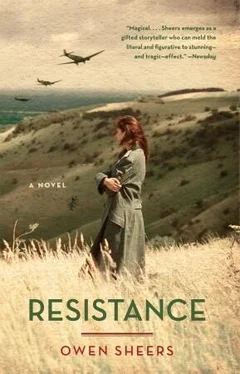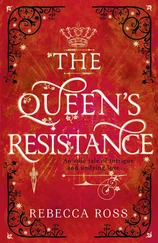Alex he’d taken with him to Sarah’s, while Gernot and Steiner he’d sent over to the other side of the valley to the middle-aged woman and the young mother. That had been a mistake. Their journey would be the hardest, through the deepest snow. They were the fittest in the patrol and that was partly why he’d sent them. He hadn’t been too worried when he’d watched them leave. The middle-aged woman would present no attraction to them and he thought that neither of them, despite Steiner’s actions on the hillside, had reached a point where a mother with young children would be in danger. They were, thank God, both relatively new to the war and so had some idea of moral dignity beyond any militaristic code. And these were British women. Had they been Slavs or Russians, he might have thought again. Had he known the two soldiers would return excitedly reporting the existence of another woman in the valley, a young girl, he would certainly have thought again and probably would not have sent them at all. She was the daughter of the middle-aged woman. Somehow her mother had kept her hidden from them for these past two months. When they told Albrecht this, he felt a rush of panic. What else had they kept hidden? They hadn’t really been looking since that first night, but still, what else were these women keeping to themselves?
Despite their excitement at discovering Bethan, Gernot and Steiner assured Albrecht they’d carried out his orders in the manner he’d asked; with respect and humility. As genuine offers of assistance and not the actions of an occupying force. But still it was evident from their report of the girl, how Gernot had described her in the air with his hands and how Steiner spoke of her mother’s worry, that their discovery complicated matters. What was more important to Albrecht right now, however, was the effect of this enterprise on all of them. They had all returned invigorated by the work they’d undertaken and by the contact they’d made. Even Otto’s excursion to the top of the hill had been a success.
When Otto hadn’t returned by the late afternoon, Albrecht had started to worry. Perhaps the simple woman was insane too. Perhaps she’d wreaked her vengeance on the war upon Otto, recognising not, after all, his fragility but just the colour and nationality of his uniform. But when Sebald and Alex went to investigate, they discovered Otto safe at the woman’s table, eating a thick soup, a newly made fire crackling in the hearth beside him. Far from seeing her son’s killer in the young German, the woman had, it seemed, simply seen another son, a boy of her own boy’s age appearing out of the snow and wind like a gift from some capricious god, who, having taken her warmth and security with one hand, had given her Otto with the other.
All of this together with his own experience at Sarah’s farm had sent Albrecht to Maggie, to meet once more like the leaders of two stand-off armies. This time, however, rather than negotiating the rules of engagement, he came offering a truce, a recipe for mutual survival through this sudden winter and, in a longer view, through what was left of this war.
At first Maggie had remained at her door, leaning against the frame with her arms folded while Albrecht spoke to her from the yard, the snow falling thickly over him, settling on his cap and shoulders. She’d even stayed there after he told her about the patrol’s visits to the other women. “Kind of you,” was all she’d said with a curt, tight-lipped nod of her head. There were steps up to her door. She was looking down at him. Albrecht, meanwhile, had shrunken against the wind and the cold, his hands clenched under his armpits. She was in the dominant position, in every way. Somehow he had to break through to her. With his men, if this was going to work at all, it had to look as natural as possible, a consequence of the vagaries of war. His own will and guiding hand must not be seen, not yet at least. But with Maggie honesty would be the only way forward, however much of a gamble his sudden openness might prove to be. He remembered Sarah’s school certificate hanging on the wall at Upper Blaen: Gambling is an unhealthy striving to gain something without giving proper return for it. It is a great evil, destructive of character, disastrous in its consequences .
“I know where your husbands have gone, Mrs. Jones,” he’d said simply, looking up at her through the falling snow from beneath the peak of his cap. “And why they have gone.”
Maggie’s expression didn’t change. She’d just continued looking down at him, a face of stone. “But I promise you,” he’d continued, trying the slightest of smiles, “that I have no interest in drawing this information to the attention of my superiors or to any Reich authorities. We both know what they will do here if I did.” He coughed into his hand, a rattling, mucous cough, as if his confession had loosened the infection in his lungs. Maggie still didn’t move. “I understand that might sound like a threat,” Albrecht continued, “but it isn’t. I can assure you I want to see them here as little as you do. You see, Mrs. Jones, none of us, myself or my men, are in any hurry to rejoin this war. Regardless of this,” he freed a gloved hand and opened his fist at the snow, “it is no longer in our interest. So you and I, Mrs. Jones, we are, in a way, in the same position.” He stamped his boots to try and warm his feet. “Neither of us wants to see the Gestapo in this valley, but what is the point of surviving them if we do not survive this winter? That is why I have come to see you.”
Maggie looked over his head at the valley, so changed overnight. She knew in her bones this was set in; that this was no brief spell of cold. That they were in this now, this winter, this altered world, for a long time. Still looking over his head, she’d eventually swung one shoulder back as if she herself were hinged to the door frame. “You’d better come in then, hadn’ you?” she’d said, walking on before him into the dark hallway. “Stamp your boots on the step, mind,” she called over her shoulder. “I don’t want you bringin’ that snow in look.”
Inside the farmhouse, sitting at the same table where the women had first seen “The Countryman’s Diary” two months earlier, Albrecht told Maggie what he had not yet told his own patrol. That in his opinion, although this war appeared to be nearly over and although major operations might soon come to an end, the low-level guerrilla fighting, here and in Europe, would continue for some time. That the Nazis needed war, dissent of some kind, as a plant needs light and water. That the Reich would always need them in the army, as part of an occupying force somewhere. That despite this, for some reason, his commanding officers appeared to have forgotten him and his patrol. That he was pleased to be forgotten. That while the fighting in England continued, he wanted to stay in this valley with his men, for as long as they could be of help and not a hindrance to Maggie and the others.
Other than his opinion on the guerrilla fighting, about which Alex and Sebald agreed, Albrecht had said none of this to his own men. As far as they and the rest of the patrol were concerned, the mythical dispatch rider he’d mentioned in Sarah’s kitchen that morning was a reality. Albrecht told them he’d met the motorcyclist at the mouth of the valley while he was out on one of his walks and that was when he’d taken the order sheet. The orders were clear, if surprising. Although their primary mission was already complete, they were to remain in the area as a temporary observational outpost. They were to wait further instructions.
Every word was a lie. There had been no dispatch rider. There had been no contact of any kind since they’d arrived in the valley. Studying his maps on the big kitchen table at The Court, Albrecht suspected he knew why. Their position lay on the border of two command sectors. The commanders of each sector would be all too quick to shift responsibility for a nomadic patrol onto the other’s shoulders. The army supply lines were stretched, they were fighting a desperate, defending nation. Winter had come upon them like a second attacking front. Any concerns they might have had about a patrol in their sector would have been drowned out in the noise and confusion of war. Albrecht and his men had inadvertently slipped off the stage of battle.
Читать дальше












